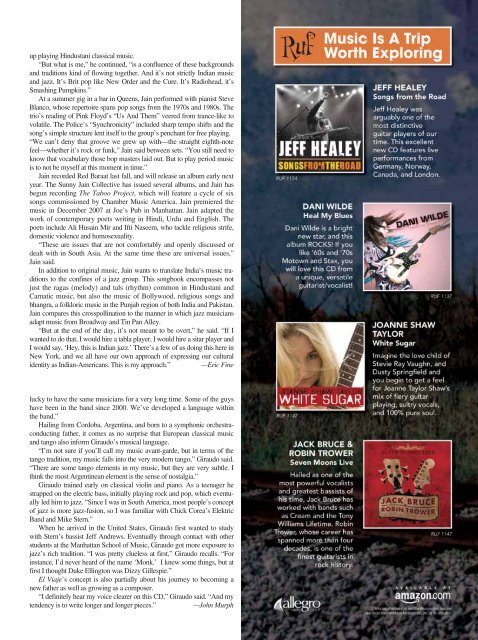Create successful ePaper yourself
Turn your PDF publications into a flip-book with our unique Google optimized e-Paper software.
up playing Hindustani classical music.<br />
“But what is me,” he continued, “is a confluence of these backgrounds<br />
and traditions kind of flowing together. And it’s not strictly Indian music<br />
and jazz. It’s Brit pop like New Order and the Cure. It’s Radiohead, it’s<br />
Smashing Pumpkins.”<br />
At a summer gig in a bar in Queens, Jain performed with pianist Steve<br />
Blanco, whose repertoire spans pop songs from the 1970s and 1980s. The<br />
trio’s reading of Pink Floyd’s “Us And Them” veered from trance-like to<br />
volatile. The Police’s “Synchronicity” included sharp tempo shifts and the<br />
song’s simple structure lent itself to the group’s penchant for free playing.<br />
“We can’t deny that groove we grew up with—the straight eighth-note<br />
feel—whether it’s rock or funk,” Jain said between sets. “You still need to<br />
know that vocabulary those bop masters laid out. But to play period music<br />
is to not be myself at this moment in time.”<br />
Jain recorded Red Baraat last fall, and will release an album early next<br />
year. The Sunny Jain Collective has issued several albums, and Jain has<br />
begun recording The Taboo Project, which will feature a cycle of six<br />
songs commissioned by Chamber Music America. Jain premiered the<br />
music in December 2007 at Joe’s Pub in Manhattan. Jain adapted the<br />
work of contemporary poets writing in Hindi, Urdu and English. The<br />
poets include Ali Husain Mir and Ifti Naseem, who tackle religious strife,<br />
domestic violence and homosexuality.<br />
“These are issues that are not comfortably and openly discussed or<br />
dealt with in South Asia. At the same time these are universal issues,”<br />
Jain said.<br />
In addition to original music, Jain wants to translate India’s music traditions<br />
to the confines of a jazz group. This songbook encompasses not<br />
just the ragas (melody) and tals (rhythm) common in Hindustani and<br />
Carnatic music, but also the music of Bollywood, religious songs and<br />
bhangra, a folkloric music in the Punjab region of both India and Pakistan.<br />
Jain compares this crosspollination to the manner in which jazz musicians<br />
adapt music from Broadway and Tin Pan Alley.<br />
“But at the end of the day, it’s not meant to be overt,” he said. “If I<br />
wanted to do that, I would hire a tabla player, I would hire a sitar player and<br />
I would say, ‘Hey, this is Indian jazz.’ There’s a few of us doing this here in<br />
New York, and we all have our own approach of expressing our cultural<br />
identity as Indian-Americans. This is my approach.” —Eric Fine<br />
lucky to have the same musicians for a very long time. Some of the guys<br />
have been in the band since 2000. We’ve developed a language within<br />
the band.”<br />
Hailing from Cordoba, Argentina, and born to a symphonic orchestraconducting<br />
father, it comes as no surprise that European classical music<br />
and tango also inform Giraudo’s musical language.<br />
“I’m not sure if you’ll call my music avant-garde, but in terms of the<br />
tango tradition, my music falls into the very modern tango,” Giraudo said.<br />
“There are some tango elements in my music, but they are very subtle. I<br />
think the most Argentinean element is the sense of nostalgia.”<br />
Giraudo trained early on classical violin and piano. As a teenager he<br />
strapped on the electric bass, initially playing rock and pop, which eventually<br />
led him to jazz. “Since I was in South America, most people’s concept<br />
of jazz is more jazz-fusion, so I was familiar with Chick Corea’s Elektric<br />
Band and Mike Stern.”<br />
When he arrived in the United States, Giraudo first wanted to study<br />
with Stern’s bassist Jeff Andrews. Eventually through contact with other<br />
students at the Manhattan School of Music, Giraudo got more exposure to<br />
jazz’s rich tradition. “I was pretty clueless at first,” Giraudo recalls. “For<br />
instance, I’d never heard of the name ‘Monk.’ I knew some things, but at<br />
first I thought Duke Ellington was Dizzy Gillespie.”<br />
El Viaje’s concept is also partially about his journey to becoming a<br />
new father as well as growing as a composer.<br />
“I definitely hear my voice clearer on this CD,” Giraudo said. “And my<br />
tendency is to write longer and longer pieces.”<br />
—John Murph<br />
November 2009 DOWNBEAT 25

















